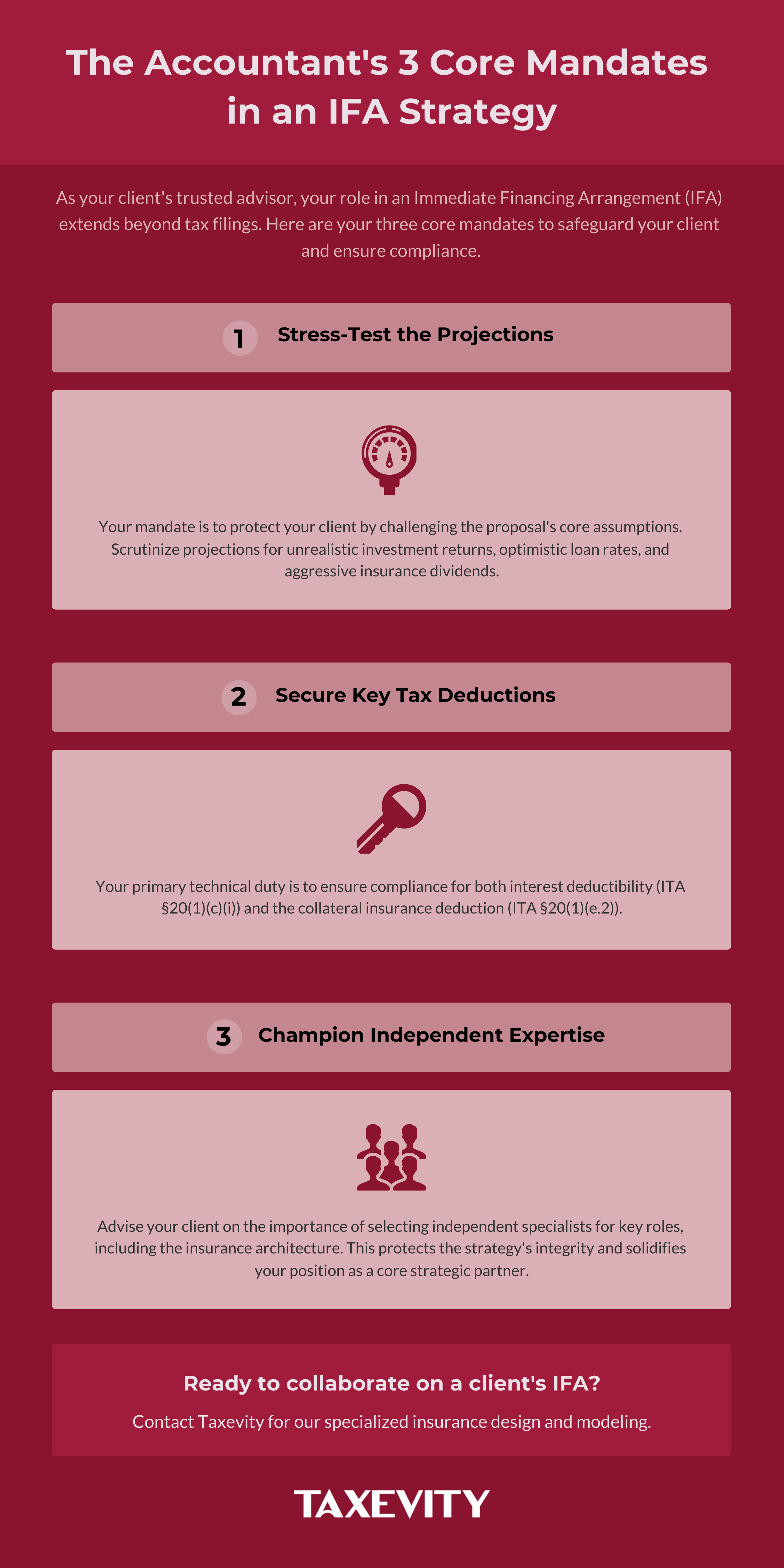(Part of the IFA Master Curriculum)
Key Question for Accountants
When your HNW client considers an Immediate Financing Arrangement (IFA), how do you fulfill your dual mandate: protecting them from strategic risk while ensuring the structure is fully compliant for key tax deductions?
- The Guardian Mandate: Your primary mandate is to act as the Guardian of your client’s interests by stress-testing all assumptions that underpin the strategy. This includes scrutinizing proposals for unrealistic investment returns, overly optimistic loan rates, and aggressive insurance dividend projections.
- The Compliance Gauntlet: Your core technical duty is to ensure the IFA is structured for tax compliance , specifically for interest deductibility (ITA §20(1)(c)(i)) and the collateral insurance deduction (ITA §20(1)(e.2)). Advising your client to maintain a meticulous audit trail is critical to substantiating deductibility in a CRA review.
- The Strategic Integrator: By championing independent expertise to protect the strategy’s integrity, you move beyond a compliance-focused role to become a core strategic partner. This positions you to act as the team ‘Integrator’—the crucial coordinator who drives the process forward and ensures all advisors are aligned.
When a high-net-worth client considers a sophisticated strategy like an Immediate Financing Arrangement (IFA), they look to their Core Advisory Team for guidance. As their accountant, you are the guardian of that team’s integrity and the pivotal line of defense against financial risk.
While our hub post, The IFA Core Advisory Team: A Requirement for Success, outlines all the roles, this guide focuses specifically on your function within that team structure. Your role is to ensure the strategy is built on a foundation of sound assumptions and strict tax compliance, enabling the entire team to succeed for your client.

Page Contents
Your Mandate on the Team: Guardian of Due Diligence
An IFA proposal integrates projections from an insurance specialist, an investment plan from a wealth advisor, and a loan from a financial institution. While each advisor is an expert in their silo, you are uniquely positioned to evaluate the holistic strategic risk. Your mandate on the team is to challenge the assumptions that underpin the entire strategy.
This includes scrutinizing proposals for:
- Unrealistic Investment Returns: Are the projected returns on the leveraged portfolio reasonable and sustainable for the long term?
- Overly Optimistic Loan Interest Rates: Does the model account for the impact of a rising interest rate environment on the loan’s carrying costs?
- Aggressive Dividend Scales: Are the non-guaranteed dividend projections from the life insurance policy presented realistically, or are they based on best-case scenarios?
Requesting a sensitivity analysis or stress-tested model from the insurance specialist is a critical first step in performing your due diligence on behalf of the team.
The Compliance Gauntlet: Your Collaborative Duty
Your most important technical function is to ensure the IFA is structured for tax compliance. The economic benefits of an IFA are significantly enhanced by two key deductions, both of which require your expert oversight and collaboration with other team members.
1. Interest Deductibility (ITA 20(1)(c)(i))
This is the cornerstone of the strategy’s tax efficiency. For the interest on the IFA loan to be deductible, you must work with the wealth advisor to ensure the borrowed funds are used for the direct purpose of earning income. We provide a detailed look at this in our Accountant’s Companion to Interest Deductibility.
- The “Purpose Test” is Paramount: You must confirm that the wealth advisor’s investment plan has a “reasonable expectation of earning income” (such as interest or dividends), not just capital gains.
- Meticulous Fund Tracing is Non-Negotiable: Advise your client on the absolute necessity of using a separate, dedicated bank and investment account for the loan proceeds. A clean audit trail is your best defense in a CRA review.
- Beware of Return of Capital (ROC): Warn clients that using ROC distributions from their investments for personal expenses can taint the deductibility of the associated loan interest.
2. Collateral Insurance Deduction (ITA 20(1)(e.2))
A portion of the life insurance premium itself may be deductible. This requires collaboration with the insurance specialist. You must verify that all strict conditions are met, and this calculation relies on the Net Cost of Pure Insurance (NCPI), a figure that the insurance specialist (like Taxevity) must provide to you annually and accurately.
As you review the proposed advisory team, be mindful of potential conflicts of interest. A wealth advisor may have an internal insurance person they are encouraged to use, or other pre-existing relationships.
Your role here is to guide your client. You can advise them that while these relationships may be convenient, the highly specialized nature of IFA policy design means that seeking an independent specialist is crucial for the team’s success. Your client has a choice, and ensuring the insurance component is architected by a firm with deep, focused expertise is essential for the strategy’s success.
The Accountant’s Opportunity: From Team Gatekeeper to Growth Partner
Your most successful clients are constantly seeking robust, reliable, and niche tax strategies. There is an unavoidable learning curve with IFAs, but mastering the diligence process is a direct investment in your practice and your client relationships.
By understanding the mechanics of a properly structured IFA, you transition from simply vetting proposals to proactively identifying opportunities. You become the “hero” who can bring a sophisticated, high-value solution to the table for your best clients. And because you have a holistic view of your client’s financial affairs, you are perfectly positioned to step into the crucial role of the team Integrator—the coordinator who drives the process forward and ensures all advisors are aligned.
We are committed to helping our accounting partners on this journey. The articles linked throughout this post are designed to build your knowledge base. We are also available for private meetings to provide a deeper understanding of our modeling and to keep you informed of new developments, ensuring you can advise your clients with confidence.
Conclusion: Your Indispensable Role on the Team
Your role in the IFA process is indispensable. By applying rigorous due diligence and ensuring strict compliance, you protect your clients from significant financial and tax risks.
This process also presents an opportunity. When you guide a client through a successful IFA, you move beyond compliance and become a core strategic partner in their wealth creation. You demonstrate your expertise, deepen their trust, and solidify your position as their most valued advisor.
At Taxevity, we provide the specialized insurance design and proprietary financial modeling. This allows you to focus on your core expertise: providing the critical tax and compliance oversight that makes the entire strategy work.
Ready to collaborate? If a client has brought an IFA proposal to you, or if you have a client you think might be a good fit, contact us to schedule a confidential, no-obligation discussion. Let’s work together to bring this powerful solution to your clients with the diligence and integrity they deserve.





